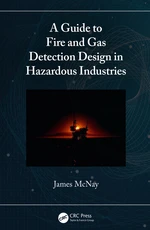In the last 15 years, the field of fire and gas mapping has grown extensively, yet very little is published on the subject. The text includes deeper discussions on important engineering factors associated with fire and gas detection, along with anecdotes and examples. It will guide the readers on what to consider when you do not have access to proprietary guides, and how to interpret the design process even when one does not have access to a guidance document. The text covers important topics including visual flame detection, flame detection mapping, infrared point gas detector (IRPGD), infrared open path gas detector (OPGD), ultrasonic/acoustic design, and gas detection mapping. The book plays the following roles: Explores practical aspects of designing a detection layout Enables users in interpreting a detector data sheet and coverage analysis Teaches readers working on a project to cut through the marketing of detection and design an effective system Inclusion of real-life experiences on projects will provide engineers with clear examples of where things can, and often do, go wrong It is an ideal text for professionals and graduate students working in the fields of occupational health and safety, fire protection engineering, and environmental safety. The text discusses fundamental aspects of fire and gas mapping, which has been applied with great success in many parts of the world and is commonly adopted by the major operators in the process industries.
Price history
▲12.51%
Jan 22, 2023
€83.08
Aug 11, 2022
€73.84

